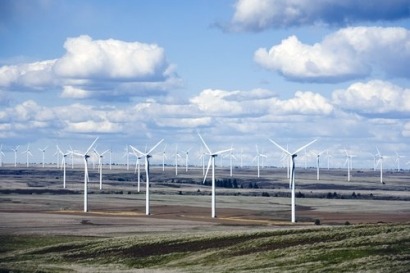
The changes to existing strategy concerning deployment of onshore wind farms will include earlier and better involvement of local communities, a five-fold increase in benefits paid by wind farm developers to local communities and a stable investment framework.
New planning guidance will make it clear that the need for more renewable energy does not automatically override environmental protection or the planning concerns of local communities. The guidance will also give greater consideration to landscape and visual impact. The government will make it compulsory for developers to build pre-application consultation with local communities into their development plans. This will ensure that community engagement takes place at an earlier stage in the process and may improve the quality of proposed onshore wind development. Ministers will be writing to the Planning Inspectorate and local councils immediately to advise them that new guidance will be available shortly.
The Department of Energy and Climate Change (DECC) will be issuing best practice guidance to onshore wind developers which will lay down the higher standards expected of them in relation to community engagement. A new register will also monitor the way in which this is applied. The industry will have to revise its Community Benefit Protocol by the end of 2013 to include an increase in the recommended community benefit package in England from the current £1,000 per MW of installed capacity per year to £5,000 per MW per year. A medium-sized 20MW wind farm deployment could therefore include a package of benefits for the local community worth £100,000 per year or up to £400 per year off each household’s annual bill.
Under the government’s guidance, local communities and developers are expected to work together to decide how the money should be used. The package could provide households with savings off their energy bills or help pay for energy efficiency initiatives, establish local training projects or fund other community programmes. The government will also publish a new Community Energy Strategy this autumn which will set out how government can encourage community ownership and investment in wind projects. DECC have today issued a Call for Evidence on this strategy to support this objective.
A joint DECC/Defra Rural Community Energy Fund will provide £15 million in loans and grants to rural communities. Eric Pickles MP, the Secretary of State for Communities and Local Government, will announce on Thursday new Department of Communities and Local Government (DCLG) planning guidance for local environmental issues including landscape, heritage and local amenities.
“It is important that onshore wind is developed in a way that is truly sustainable – economically, environmentally and socially, and today’s announcement will ensure that communities see the windfall from hosting developments near to them, not just the wind farm” said Ed Davey, the Energy and Climate Change Secretary. “We remain committed to the deployment of appropriately sited onshore wind, as a key part of a diverse, low-carbon and secure energy mix and committed to an evidence-based approach to supporting low carbon power. This is an important sector that is driving economic growth, supporting thousands of new jobs and providing a significant share of our electricity and I’m determined that local communities should share in these benefits.”
The Energy Minister, Michael Fallon, added that the new government measures will put “local people at the heart of decision making on onshore wind.”
“We are changing the balance to ensure that they are consulted earlier and have more say against poorly sited or inadequately justified turbines” Mr Fallon continued. “When new turbines are agreed, we will ensure that they are developed in a way that benefits the local community, such as through cheaper energy bills.”
The government will deliver the new measures in collaboration with industry and local communities over the next twelve months.
Further information:

